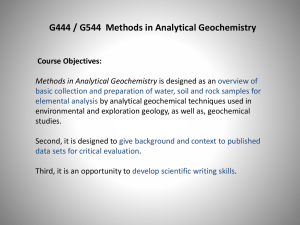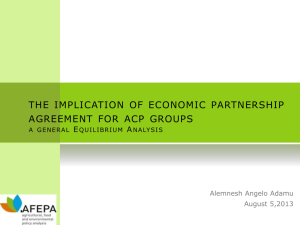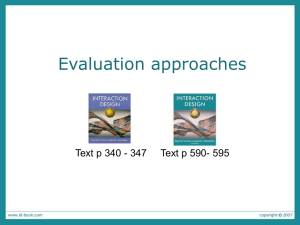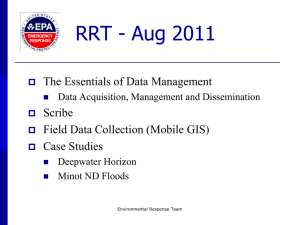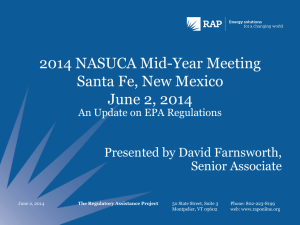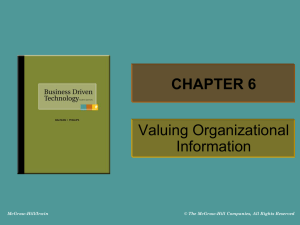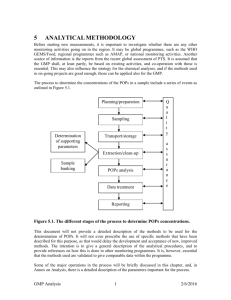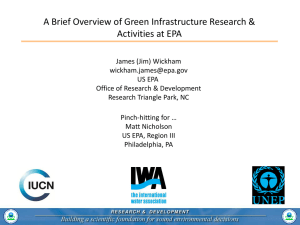Electronic Management of Environmental Analytical Data
advertisement
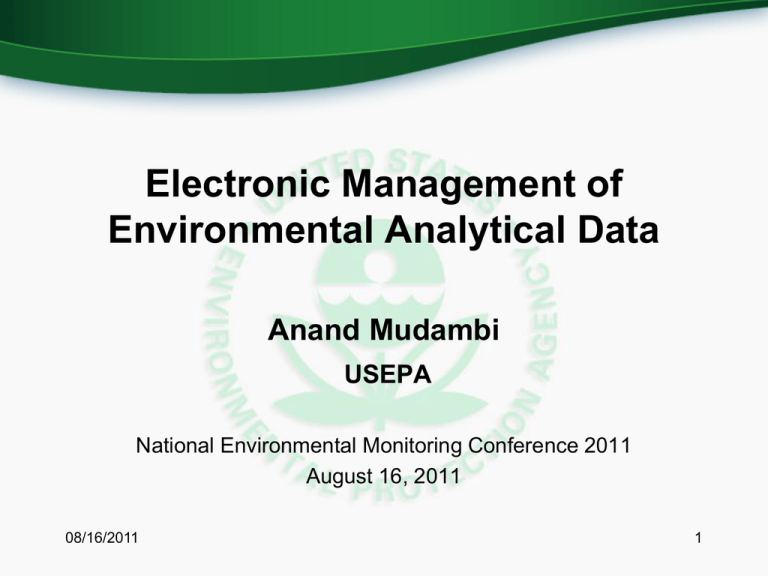
Electronic Management of Environmental Analytical Data Anand Mudambi USEPA National Environmental Monitoring Conference 2011 August 16, 2011 08/16/2011 1 Data Management Issues • Multiple databases, processes, procedures, and methods for the same information • Consistent and stable business driven framework needs to be prescribed with all data generated registered into an Agency catalogue 08/16/2011 2 Data Management Goals • Need to develop and implement: – paperless data generation – paperless data transfer/exchange – review and management (input and retrieval) systems for all types of project data (e.g., field, chain-of-custody, analytical) 08/16/2011 3 General Environmental Data Flow - Need to Go Electronic QAPP ANALYTICAL REQUIREMENTS SENT TO LABORATORY 1 Project Scope Defined 2 3 Quality Assurance Project Plan (QAPP) Requirements Identified Field Activities 4 SAMPLES + CHAIN OF CUSTODY INFORMATION ANALYTICAL DATA PACKAGE (with Laboratory Qualifiers) FIELD LOGS INFORMATION 7 Data May Support Future Projects 08/16/2011 Data Repository e.g., Database (Project or General) 6 DATA USED IN PROJECT DECISION (S) Data Quality Assessment of Field and Laboratory Data Laboratory Analysis and Reporting 5 VALIDATED ANALYTICAL DATA External Party Validation of the Laboratory Analytical Data 4 Some Data Management System Concepts • Need to build systems that are used regularly • Same systems for regular and emergency use • System should be capable of being scaled up or down (e.g., number of samples, reporting of QC data) 08/16/2011 5 Data Management Frameworks: Examples • EPA’s Environmental Response Laboratory Network and Water Laboratory Alliance • EPA’s Contract Laboratory Program • USACE ADR.net 08/16/2011 6 General Environmental Data Flow: Needs for Going Electronic • Standard formats for electronic project requirements. • Standards/templates for field information. • Standard formats for reporting analytical data. • Standard procedures for reviewing analytical data. • Standard formats for reporting reviewed analytical data 08/16/2011 7 Standard Format Requirements • Non-Proprietary Formats (e.g., XML) • Use international standards for Valid Values (e.g., ISO, IEEE, ASTM) • Guidance/Specification/Requirement Documents 08/16/2011 8 First Needs: Data Capture Requirements • Need to develop the following: – Standard Specification for Laboratory Instrument Output files (e.g., NIST’s AnIML) – Standard Specifications for Laboratory Information Management Systems (e.g., as an RFP) – Standard Electronic Versions for Measurement Quality Objectives (e.g., ERLN WebEDR MQO Template) 08/16/2011 9 Followed By: Adoption of Standard Reporting Formats/Guidance • Laboratory Data – e.g., Staged Electronic Data Deliverable (SEDD) for EPA (ERLN, CLP, GLPNO) and USACE programs, ERLN EDDs • Chain-of-Custody Information – e.g., WLA Response Plan (Appendix H) 08/16/2011 10 Then: Data Reporting Formats/Tools • EPA and NIST – Developing an electronic deliverable that contains all laboratory and instrument data in a nonproprietary format for archival and retrieval (SEDD with AnIML) • EPA Forms Generator – Generating different reporting formats from the same electronic deliverable (e.g., CLP and CLP – like forms) 08/16/2011 11 Leads to: Data Assessment • Data Analysis or Assessment – Confidence in the reliability of data and ability to use appropriately are important – Consistent application of the data life-cycle and enforcement of data quality policies for greater confidence – Scientific Integrity 08/16/2011 12 Facilitating Data Assessment by Automating Data Review • Example Data Review Software EPA ERLN WebEDR, EPA CLP EXES, USACE Automated Data Review.NET • Need Specifications for Data Review Software 08/16/2011 13 Facilitating Data Assessment by Identifying Data Quality • Capturing Data Review Steps In End User Databases – e.g., EPA’s Guidance for Labeling Validated Analytical Data 08/16/2011 14 Why do all this: Benefits • Ease of data exchange • Ease of data storage and retrieval • Allows for verifying reported data (current and in future) • Allows for reuse of data 08/16/2011 15 Getting to an Electronic World • Need to get rid of the “Not-Invented-HereSyndrome” (i.e., adoption of agency specific standards/systems) • Need all parties (Federal and State Labs) to cooperate and adopt a set of data management standards that can be used by all parties 08/16/2011 16 Websites - 1 • ERLN: http://www.epa.gov/oemerln1/ • WLA: http://water.epa.gov/infrastructure/watersecurity/ wla/index.cfm 08/16/2011 17 Websites - 2 • SEDD: http://www.epa.gov/fem/sedd.htm • EPA’s Guidance for Labeling Validated Analytical Data : http://www.epa.gov/superfund/policy/pdfs/ EPA-540-R-08-005.pdf 08/16/2011 18 Contact Information • Anand Mudambi Mudambi.Anand@epa.gov 202-564-2817 • Joseph Solsky Joseph.F.Solsky@usace.army.mil 402-697-2573 08/16/2011 19
